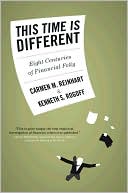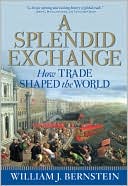Reinventing the Bazaar: A Natural History of Markets
Clear, insightful, and nondogmatic, this book gives us a new appreciation for one of our most ubiquitous institutions.\ From the wild swings of the stock market to the online auctions of eBay to the unexpected twists of the world's post-Communist economies, markets have suddenly become quite visible. We now have occasion to ask, "What makes these institutions work? How important are they? How can we improve them?"\ Taking us on a lively tour of a world we once took for granted, John McMillan...
Search in google:
Clear, insightful, and nondogmatic, this book gives us a new appreciation for one of our most ubiquitous institutions. Reed E. Hundt Required reading for anyone who wants to understand the "magic" of markets... Lucidly explained, brilliantly analyzed, and delightfully explored.
Prefaceix1.The Only Natural Economy32.Triumphs of Intelligence153.He Who Can't Pay Dies274.Information Wants to Be Free415.Honesty Is the Best Policy536.To the Best Bidder657.Come Bid!758.When You Work for Yourself899.The Embarrassment of a Patent10310.No Man Is an Island11911.A Conspiracy against the Public13612.Grassroots Effort14813.Managers of Other People's Money16714.A New Era of Competition18215.Coming Up for Air19616.Antipoverty Warriors21117.Market Imperatives224Acknowledgments231Endnotes233References247Index263
\ Harvard Business Review“An illuminating refresher course in how economies really work.”\ \ \ \ \ Washington Post“An insightful, common-sense, jargon-free tour of all sorts of markets.”\ \ \ New York Times Book Review“The perfect book for the Age of Enron.”\ \ \ \ \ Peter L. Bernstein“You may have heard that economics is the dismal science. Not in McMillan's hands. Here economics is fun, fascinating, ... fruitful.”\ \ \ \ \ Joseph E. Stiglitz“There could be no better guide to the modern view of markets than McMillan's new book.”\ \ \ \ \ Hal R. Varian“Lively [and] instructive... A colorful and authoritative look at how markets work and don't work in today's economy.”\ \ \ \ \ Reed E. Hundt“Required reading for anyone who wants to understand the "magic" of markets... Lucidly explained, brilliantly analyzed, and delightfully explored.”\ \ \ \ \ Kenneth J. Arrow“McMillan's rich knowledge of ... current economic theory and ... economies in transition is well embodied in this ... sophisticated survey.”\ \ \ \ \ Peter L. BernsteinYou may have heard that economics is the dismal science. Not in McMillan's hands. Here economics is fun, fascinating, ... fruitful.\ \ \ \ \ Joseph E. StiglitzThere could be no better guide to the modern view of markets than McMillan's new book.\ \ \ \ \ Hal R. VarianLively [and] instructive... A colorful and authoritative look at how markets work and don't work in today's economy.\ \ \ \ \ Reed E. HundtRequired reading for anyone who wants to understand the "magic" of markets... Lucidly explained, brilliantly analyzed, and delightfully explored.\ \ \ \ \ Kenneth J. ArrowMcMillan's rich knowledge of ... current economic theory and ... economies in transition is well embodied in this ... sophisticated survey.\ \ \ \ \ Publishers WeeklyAn economics professor at the Stanford University Graduate School of Business, McMillan views this historical moment as a unique living laboratory for observing how technology, globalization and changing expectations of buyers and sellers have brought changes to everything from the international flower market based in the Netherlands to national economies. The sheer number of ingenious schemes that have surfaced over the last decade has had an intoxicating effect on McMillan; he skips from the 1994 FCC auction of the electromagnetic spectrum for pagers to the hugely popular Internet auction sites and the effects of intellectual property rights on innovation in this anecdotally rich survey of world markets and new trading opportunities. McMillan looks at a wide variety of industries including interstate trucking and fishery management and lays out the elements he regards as necessary for a smoothly operating market. An illuminating chapter comparing the deregulation and privatization experiences of New Zealand, Russia and China will leave readers wishing that McMillan had concentrated on just a few examples to establish in-depth his primary points: that good design of a market is crucial to its success, that a market develops over time by trial and error, and that government plays an indispensable role in providing public goods and acting as rule setter and referee in the best of all market-based worlds. As it is, the book feels scattered, and McMillan's tone is by turns condescending and frustratingly abstruse. Many readers will be disappointed. (May) Copyright 2002 Cahners Business Information.\ \ \ \ \ Library JournalReaders looking for a basic primer on how our "market economy" works will find no better treatment than this first book by Stanford University professor McMillan. Taking the long view, he examines how markets in ancient times evolved and shows how countries experimented with markets, some successfully and some not. Not surprisingly, he judges countries like Russia and China with their centralized economies as not being truly market driven, but he lauds them for recent changes. Although he does raise the flag on "free markets" a bit much, he takes a refreshingly commonsense approach to his subject, doesn't talk down to his readers, and refrains from excessive economic jargon. The Internet is praised for breaking down barriers, and he terms the eBay web site "a high-tech flea market." Government deregulation is a good thing, but California, in his opinion, made a mess of it resulting in the energy crisis of last year. The bottom line for McMillan is that "the market system is like democracy. It is the worst form of economy, except for all the others that have been tried from time to time." Recommended for academic and larger public libraries. Richard Drezen, Washington Post/New York City Bureau Copyright 2002 Cahners Business Information.\ \ \ \ \ Kirkus ReviewsA wide-ranging, illuminating history of that old, colorful, and sometimes disgraceful institution known as the marketplace: exotic, innovative, and everyday; on terra firma and in cyberspace; bazaar to eBay. "Reinventing" is a vital notion here, for the best markets, says McMillan (Economics/ Stanford Univ. Graduate School of Business), are those that develop from the bottom up over time through trial and error, always restless and reshaping themselves with creativity and flexibility. Shortcutting the process rarely works. Then again, markets would never attain their fullest potential without a soupçon of government intervention when age-old procedures need to be formalized and authority given to enforce the results, or as a means of "providing goods and services that markets would undersupply and acting in the background as market rule-setters and referees." McMillan lays out the prerequisites for a successful market: "information flows smoothly; property rights are protected; people can be trusted to live up to their promises; side effects on third parties are curtailed; and competition is fostered." He is well aware of the absurdities and cruelties such a system may spawn (patent law is a good example), though he endeavors to understand poverty and inequality as structural rather than inherent in the marketplace. McMillan has his heart in the right place and isn't about to sniff at suffering. Unlike free-market zealots, he appreciates that markets are imperfect and can even be disastrous. They are also, he reminds us, a natural economy, "too important to be left to ideologues," and they are "not just about money. A well-designed competitive market puts resources into the hands of thosewho can best use them." Design is the issue here, a delicate balance between the organic evolution of the market and state oversight. Felicitous economics? Hard to believe, but McMillan's prose resembles single malt, going down easy as it stimulates. Clarifying and humanistic.\ \








